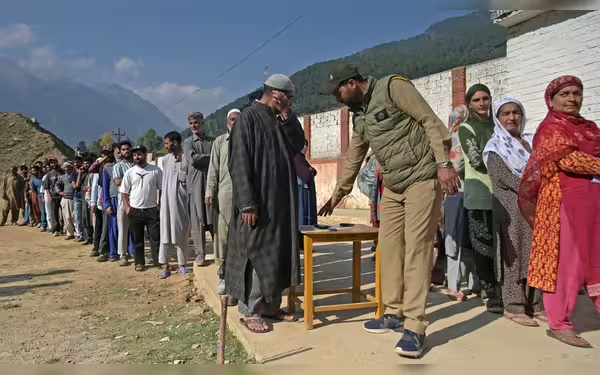Saturday, November 16, 2024 05:40 PM
Kashmir Elections: Security Tightens as Voters Cast Ballots
- Kashmir holds crucial elections after 2019 autonomy revocation.
- Security heightened with 500,000 troops deployed in the region.
- Voter hopes for local representation amid ongoing unrest.
 Image Credits: arabnewspk
Image Credits: arabnewspkKashmir votes in regional polls amid tight security, marking a significant step towards local governance after 2019 autonomy revocation.
In a significant political development, Indian-administered Kashmir held its second round of regional polls on Wednesday, marking the first time the region has had the opportunity to elect its own government since the controversial revocation of its semi-autonomous status by the Indian government in 2019. This change, initiated by Prime Minister Narendra Modi, has been a source of tension and unrest in the region, which has been grappling with a long-standing insurgency.
The revocation of autonomy led to widespread protests and a heavy security presence, as the Indian government sought to maintain control over the predominantly Muslim territory. Since that pivotal moment, Kashmir has been governed by a federally appointed governor, leaving the local populace without elected representation. The current elections are seen as a crucial step towards restoring some level of self-governance.
On Wednesday, security was notably tight as approximately 8.7 million registered voters prepared to cast their ballots. Paramilitary troops were deployed to guard polling stations and patrol the streets of Srinagar, which appeared largely deserted. Early voter turnout was low, but many residents expressed hope for a change. One voter, Tariq Ahmed, shared his sentiments, stating, "Since the last election ten years ago we were left at the mercy of God. No one asked us about our problems. I am happy this election is happening. I hope we get our own representative with whom poor people like myself can raise everyday issues." This reflects a broader desire among the populace for local representation and accountability.
The polling stations opened at 7 am, and expectations for voter turnout were high, especially compared to previous elections that saw boycotts from separatist groups. These groups have historically opposed Indian rule, advocating for either independence for Kashmir or its merger with Pakistan. The region has been divided between India and Pakistan since the end of British colonial rule in 1947, with both nations claiming the territory in full.
The first phase of the elections took place on September 18, where 61 percent of voters participated. The ongoing security challenges have led to a staggered election process, with the final round scheduled for October 1. Approximately 500,000 Indian troops are stationed in the region, a reflection of the ongoing conflict that has claimed countless lives over the past 35 years.
International interest in the elections is evident, with diplomats from 16 foreign missions, including representatives from the United States and Russia, arriving in Srinagar to observe the voting process. The high unemployment rate and dissatisfaction with the 2019 changes have fueled campaign efforts, with regional parties promising to advocate for the restoration of autonomy.
Despite the local elections, key decisions regarding security and governance will remain under the control of New Delhi. The Indian government retains the authority to override any legislation passed by the newly elected assembly, which consists of 90 seats. Modi's Bharatiya Janata Party (BJP) claims that the changes have ushered in a new era of peace and economic growth in Kashmir, a narrative that regional parties strongly contest.
As the elections unfold, the political landscape in Jammu and Kashmir remains complex and divided. Modi's campaign efforts have focused on garnering support in both the Kashmir valley and the Hindu-majority Jammu areas, while critics accuse the BJP of attempting to dilute the Muslim vote by promoting independent candidates in the valley. The outcome of these elections could have lasting implications for the region's governance and the relationship between the local populace and the Indian government.
The ongoing elections in Indian-administered Kashmir represent a pivotal moment for the region, as residents seek to reclaim their voice and influence in governance. The outcome will not only shape the political future of Kashmir but also reflect the broader aspirations of its people for autonomy and representation. As the world watches, the hope for a peaceful and democratic process remains paramount.













